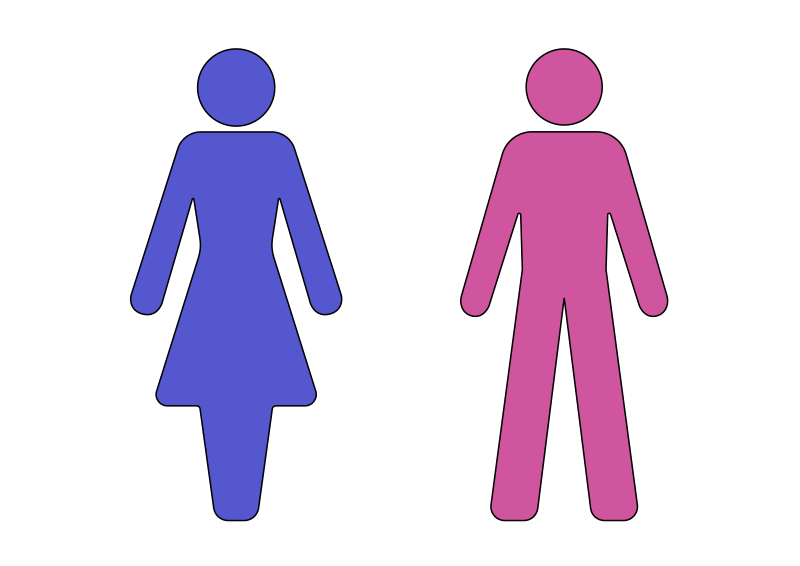Are Gender Roles Harmful to America’s Youth?
October 22, 2021
Trigger warning: This article mentions eating disorders and suicide. Here are some resources that are available:
If you feel you are at risk of suicide, help is available 24 hours a day through the National Suicide Prevention Hotline: 800-273-8255
If you are struggling with an eating disorder, please contact a medical professional or help is available from the National Eating Disorder Association Monday-Thursday 11 a.m.-9 p.m.: 800-931-2231
Gender roles are attributes assigned to each gender; they can include attitude, interests, how someone looks and what they wear. Gender roles have been around forever, and they have changed a lot over time. What used to be deemed “normal” “accepted” and even “natural” for each gender in America has changed over time. So how do American gender roles today affect individuals and society as a whole?
Some of the biggest problems American youth face today can be traced back to gender roles and society’s insistent adherence to them, and combined, these adversities fueled by gender roles are emotionally and physically harmful to America’s youth.
Eating disorders are a very big problem in America and are usually motivated by social pressure to look a certain way. According to an article written for Jahonline.org, the difference in how eating disorders present between those who identify as female and those who identify as male can tell us a lot about how expectations on how you should look based on your gender are harmful. For women with eating disorders, there is often a fixation on being “thin” and “skinny.” Men with eating disorders, on the other hand, tend to put their minds to being “muscular“ and “lean.” This difference is backed by what we think of as society’s ideals for what each gender should be.
Furthermore, according to a survey done by Pew Research Center, most Americans would assume that women should be better at caring, less aggressive, prioritize their looks, be not as strong and be quiet/submissive. Men should be better at working, protecting, should be uncaring, should focus on what they provide, and should be strong and loud/assertive. Both young girls and guys can fall victim to trying to be what gender roles tell them they must be. Often they try so hard, they stop eating normally to get there. Trans and nonbinary youth also suffer even more from these rules and regulations. Two studies referenced by this article by Penn Medicine found that trans youth are four times more likely to report an eating disorder than their cis-gendered female counterparts. Often they feel as though to be seen as their preferred gender and “pass,” they have to not only act a certain way but also look a certain way. They feel the need to fit hyperfeminine or hypermasculine or hyperandrogynous ideals to be seen as who they are. Holding trans people to appearance-based gender roles to be seen and referred to as their correct gender can result in eating disorders developing due to dysphoria. Gender roles can be very harmful to trans kids’ physical well-being.
According to the South Carolina Department of Health, it is estimated that 8 million Americans have eating disorders, about 7 million women and 1 million men. 18-20% of people with anorexia nervosa will die within 20 years of contracting the disease and only 30-40% will ever recover. And for women and girls ages 15-24, the mortality rate of anorexia is 12 times higher than that of any other cause of death. Eating disorders are deadly, and eating disorders in both cis and trans men and women, as well as nonbinary folks, are very often motivated by the need to fit into social norms for their gender.
What about the positive influences of gender norms? Many arguments regarding the positive influence of gender roles are based on the belief that men and women are naturally and biologically programmed to complete certain roles. An article written by Tyler Jeanneret for Mill Valley News posits that men and women fill different but complementary social and family roles. That gender roles are a biological ideal that one should strive to fulfill. That people of each gender should strive to fill their roles to make society stronger.
Readers, please note that the only time biology is mentioned in this article is in reference to women being “natural and biological child-bearers.” In the article, it says that this is not stereotypical or constricting. We know women are the ones to carry and birth children, and if they choose, breastfeed them after birth. But, are women actually better at raising children naturally? A new study was led by Psychologist and Neuroscientist Ruth Feldman at Bar-Ilan University in Ramat Gan, Israel on new parents both from homes with a father and a mother, who took more traditional roles with the mother caring for the baby more than the father, and homes with two fathers who split care equally. The parents were shown videos of themselves interacting with their children and their brain activity was measured. The results showed that the parents in heterosexual relationships’ brains did light up slightly differently. The mother’s brain was activated more in the deeper, more hardwired parts of the brain. However, both the brains of the men in the homosexual couple reacted the way the mothers from the heterosexual couples did. It seems that simply interacting and caring for a baby with no mother in the picture configured the fathers’ brains to be just as much of “natural and biological child-bearers” as the women who took on more traditional child care roles. Jeanneret ‘s article goes on to say that “some women may need to work,” but that it is not the ideal they should strive for. In a world where money buys you clothes, housing, food for those children women are “biologically built to make,” and most everything else, how is not working and having your not making your own money not constricting? How is setting the ideal as complete reliance on another person not downright oppressive?
As of 2019, suicide was the 10th leading cause of death in the U.S, and according to an article by Baton Rouge General hospital, men are 3.6 times more likely to die by suicide than women. Why? They seek help less often. Men are much less likely to seek help for conditions like depression. Men are more likely to withhold mental health information from doctors when they do seek help. When one of the most well-known and harmful stereotypes for men is needing to be strong, mentally and physically, it is easy to see why. If you use different words such as provider, reliable, or assertive, or if you use phrases like “bringing physical and financial security,” the outcome is the same.
If you teach men to value appearing strong, assertive, like a leader, reliable, like a provider, while also punishing them when they do not live up to these ideals, they will not reach out in fear of being seen as weak, and this could cost them their lives. If they learn their role and then decide to forcibly hold others accountable to their presumed role, that can be just as deadly.
Forcibly holding other people to the same gender roles as you believe they should be filling can also be extremely harmful. As a kid, I had to listen to my family’s belief on what “should be done” about gay and trans people. When my brother turned out to be trans and moved in with my mother to have a more supportive home, I listened to my mother as she talked about why she picked Vermont for my brother’s safety. When my brother was looking at colleges, I again listened to my mother worry about which colleges my brother would be safe at. When my mother worried, she wasn’t worrying only in the way a mother would about her son. She worried about what others would do to a trans person that didn’t fit their gender role ideal. When I came out as pansexual and genderfluid, she had to worry about my safety, too.
Gender roles are harmful to the physical and emotional health of young people in America. Gender roles are not only harmful to the girls, boys and non-binary youth that believe in them, they can also be harmful to those who must try to be who they are under the threat of violence for not fulfilling others’ ideals of what those who are assigned female or male at birth should act and look like.
If you are one of my peers at school, please take a look at how you express your gender and make sure you and those around you are safe. Liking makeup, dresses, sports, cars, tuxedos, and anything else is okay no matter your gender. Stay safe and please keep in mind how trying any behaviors or appearances of a gender can be harmful to you and those around you. If you are a parent, please talk with your children about this issue in an age-appropriate manner and decrease their likelihood of causing themselves or others harm.











tanner dalley • Oct 29, 2021 at 8:14 am
based